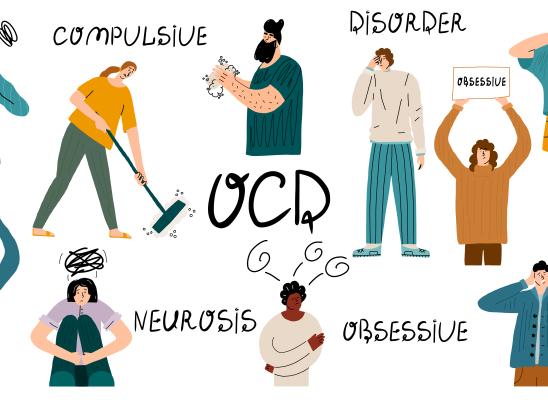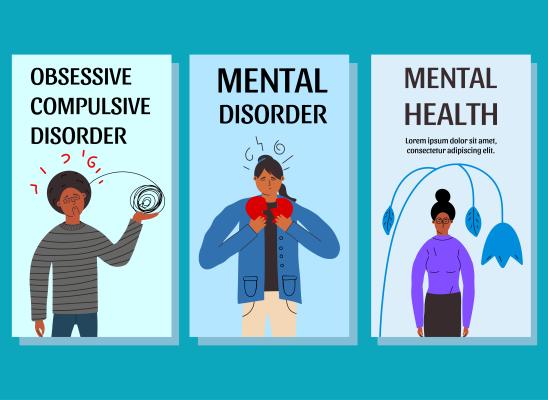
Online test
Find out the severity of your symptoms with this free online test
Obsessive-compulsive disorder, or OCD, is more than just being super tidy or double-checking things. It’s a mental health condition that causes intense, unwanted thoughts (called obsessions) and urges to do repetitive actions (called compulsions). These symptoms can get in the way of everyday life—school, work, relationships, and even sleep.
Thankfully, there are treatments that work. Therapy, especially a type called Exposure and Response Prevention (ERP), is one of the best options. But for many people, antidepressant medications can also help a lot. This article is here to break things down in a simple, friendly way: What types of antidepressants are used to treat OCD? How well do they work? What are the pros and cons? And when should someone consider taking them? Let’s explore.
Why Antidepressants for OCD?
It might sound strange at first—using “antidepressants” for OCD? But it actually makes sense. These medications affect brain chemicals like serotonin, which play a big role in both depression and anxiety. Research shows that boosting serotonin levels can help ease OCD symptoms (Fineberg et al., 2020). So while they’re called “antidepressants,” many of them are also really helpful for OCD.
Types of Antidepressants Used for OCD
Not all antidepressants are the same. There are a few main categories that doctors use when treating OCD.
1. Selective Serotonin Reuptake Inhibitors (SSRIs)
SSRIs approved as first-line treatment by the Food and Drug Administration (FDA) include:
- Fluoxetine (Prozac)
- Sertraline (Zoloft)
- Fluvoxamine (Luvox)
- Paroxetine (Paxil)
These medications work by increasing serotonin in the brain. This can help reduce the anxiety that fuels obsessive thoughts and compulsive behaviors.
Example: Emma had OCD that made her check the stove dozens of times a day. Her doctor started her on sertraline. After about ten weeks, she still had the urge to check—but now she could stop herself more easily, and the thoughts weren’t as scary.
SSRIs usually take 6–12 weeks to start working for OCD, and the doses are often significantly higher than what’s used for depression (Skapinakis et al., 2016).
2. Tricyclic Antidepressants (TCAs)
Before SSRIs became popular, there was clomipramine (Anafranil). It’s called a tricyclic antidepressant and was actually the first drug specifically approved for OCD.
Clomipramine can be very effective, sometimes even more than SSRIs. But it also has more side effects, like dry mouth, dizziness, and constipation (Bandelow et al., 2016).
Example: After trying two SSRIs with little improvement, Jason’s doctor recommended clomipramine. It helped his symptoms a lot, but he had to stay hydrated and take it easy when standing up quickly because of the dizziness.
3. Serotonin-Norepinephrine Reuptake Inhibitors (SNRIs)
SNRIs like venlafaxine (Effexor) increase both serotonin and norepinephrine. They’re not typically the first choice for OCD, but they may be used if SSRIs don’t work or if the person also has depression.
Some small studies have shown they can help, especially when combined with therapy (Pittenger & Bloch, 2014).
4. Combination and Augmentation Treatments
Sometimes, a single antidepressant isn’t enough. Doctors might try:
- Adding a second medication, like an antipsychotic (e.g., risperidone)
- Increasing the dose of the antidepressant
- Combining meds with ERP therapy
These “augmentation” strategies can give people the extra help they need if symptoms don’t improve with one medication alone (Fineberg et al., 2020; Stein et al., 2019).
Example: Maya’s OCD didn’t respond enough to an SSRI like fluoxetine, alone. Her psychiatrist added a low dose of aripiprazole (an antipsychotic medication). That extra boost made a big difference in her ability to manage intrusive thoughts.
How Well Do These Medications Work?
Medications don’t “cure” OCD, but they can make it much more manageable. Research shows that about 50–60% of people with OCD improve when they take SSRIs or clomipramine (Skapinakis et al., 2016). Improvements might look like fewer obsessions, shorter rituals, or less anxiety about not doing a compulsion.
It’s important to give the meds time to work. OCD takes longer to treat than depression. While some people feel better after a month, others may need up to three months to notice real changes.
Pros and Cons of Taking Antidepressants
Like anything, antidepressants have good sides and not-so-good sides.
Pros:
- Can reduce OCD symptoms
- Can make engaging in therapy easier
- Can increase daily functioning
- Can improve mood and sleep
Cons:
- Side effects like upset stomach, sleep issues, or sexual problems
- Take time to work
- May need to try more than one to find the right fit
Example: Alex started on paroxetine but had trouble sleeping. After switching to fluvoxamine, he found the side effects easier to handle and could focus better in therapy.
When Should Medication Be Considered?
Not everyone with OCD needs medication. Some people do really well with ERP therapy alone. But there are times when adding medication makes sense:
- When OCD is severe or interferes with daily life
- If therapy alone hasn’t helped
- If there’s also depression or a lot of anxiety
- When it’s hard to access a qualified ERP therapist
Medication can help take the edge off the anxiety, making it easier to face fears during therapy.
Example: Jordan had panic attacks every time he tried ERP exercises. His therapist recommended he try an SSRI to lower his baseline anxiety. After a couple of months, he was able to try exposures without panicking.
The Importance of Talking With Your Treatment Team
Deciding whether to take medication is personal. That’s why it’s so important to talk openly with your treatment team. This might include your therapist, psychiatrist, primary care doctor, or even a supportive family member.
Here are some helpful things to ask your doctor:
- What are the possible side effects?
- How long will it take to see results?
- What happens if it doesn’t work?
- Are there other options?
- What’s the plan for starting, continuing, and (if needed) stopping the medication?
Honest conversations help you feel informed and in control. Your voice matters. If you’re nervous, that’s okay—bring notes or a friend to the appointment if it helps.
Example: Layla was hesitant to take meds because of stories she read online. Her therapist and psychiatrist answered all her questions and gave her time to decide. That support made her feel more confident when she finally started treatment.
Final Thoughts
Antidepressants can be a powerful part of treating OCD, but they’re not a magic fix—and they’re not the only option. Many people do best with a combination of therapy and medication. Others may choose one or the other, depending on their symptoms and preferences.
SSRIs are usually the first type of medication doctors try. Clomipramine and SNRIs are options too, especially if SSRIs don’t work. Sometimes, combining meds or adding therapy can lead to better results.
The most important thing is to work with a team you trust and to have open conversations. OCD is a tough condition, but with the right help, things really can get better.
If you’re ready to learn more or start your treatment journey, contact our specialized therapy team today. At StopOCD we can connect you with experts who understand OCD and can help you find the treatment that’s right for you.
References
- Bandelow, B., Michaelis, S., & Wedekind, D. (2016). Treatment of anxiety disorders. Dialogues in Clinical Neuroscience, 18(2), 93–107 https://pubmed.ncbi.nlm.nih.gov/28867934/
- Fineberg, N. A., Hollander, E., Pallanti, S., Walitza, S., Grünblatt, E., Dell'Osso, B., ... & Stein, D. J. (2020). Clinical advances in obsessive-compulsive disorder: a position statement by the International College of Obsessive-Compulsive Spectrum Disorders. International Clinical Psychopharmacology, 35(4), 173–193. https://pubmed.ncbi.nlm.nih.gov/32433254/
- Pittenger, C., & Bloch, M. H. (2014). Pharmacological treatment of obsessive-compulsive disorder. Psychiatric Clinics, 37(3), 375–391. https://pubmed.ncbi.nlm.nih.gov/25150568/
- Skapinakis, P., Caldwell, D., Hollingworth, W., Bryden, P., Fineberg, N., Salkovskis, P., ... & Churchill, R. (2016). Pharmacological and psychotherapeutic interventions for management of obsessive-compulsive disorder in adults: a systematic review and network meta-analysis. The Lancet Psychiatry, 3(8), 730–739, https://pubmed.ncbi.nlm.nih.gov/27318812/
- Stein, D. J., Costa, D. L. C., Lochner, C., Miguel, E. C., Reddy, Y. C. J., Shavitt, R. G., ... & Fineberg, N. A. (2019). Obsessive–compulsive disorder. Nature Reviews Disease Primers, 5(1), 52. https://doi.org/10.1038/s41572-019-0102-3
- Casale, A. D., Sorice, S., Padovano, A., Simmaco, M., Ferracuti, S., Lamis, D. A., Rapinesi, C., Sani, G., Girardi, P., Kotzalidis, G. D., & Pompili, M. (2019). Psychopharmacological Treatment of Obsessive-Compulsive Disorder (OCD). Current Neuropharmacology, 17(8), 710. https://doi.org/10.2174/1570159X16666180813155017
Online test
Find out the severity of your symptoms with this free online test
Start your journey with StopOCD
Take control of your life and find freedom from OCD through professional therapy and evidence-based cognitive behavioral techniques.
Start Now



